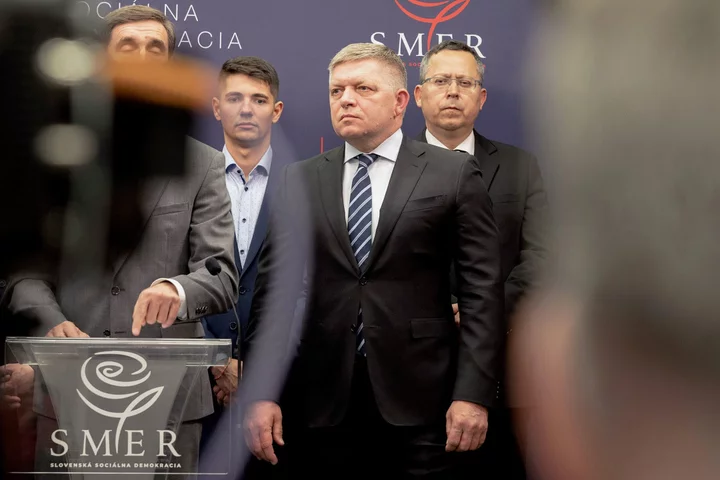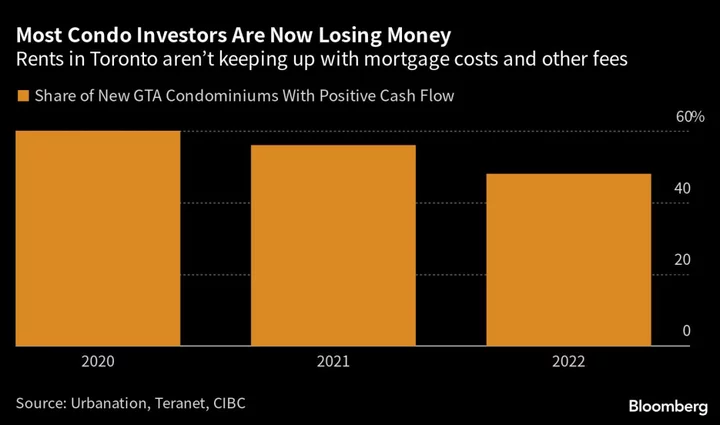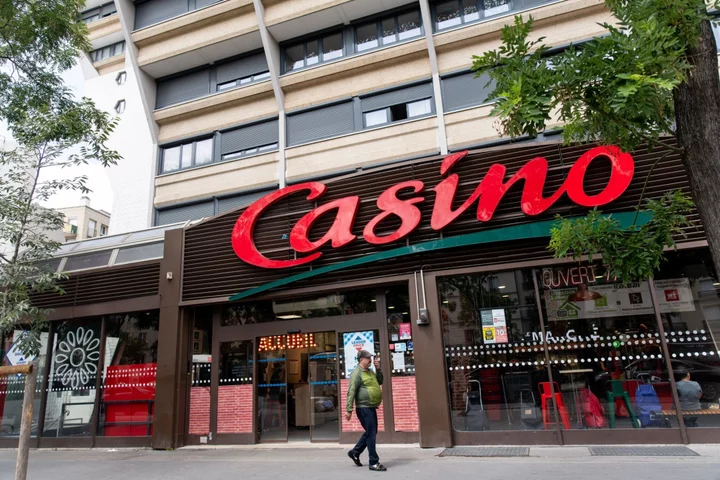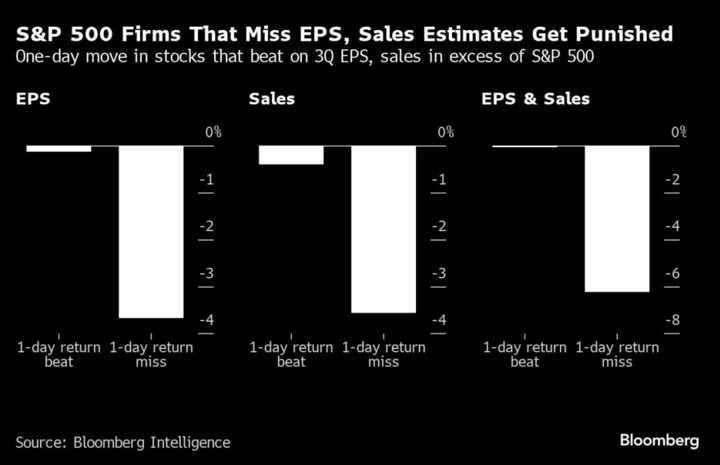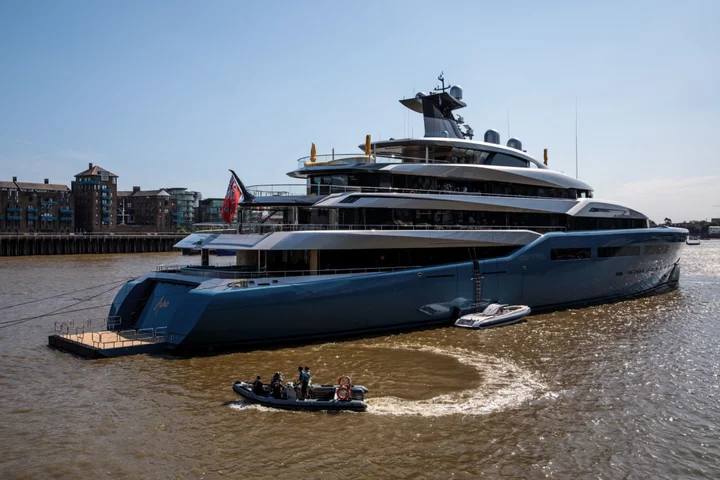When Slovakia’s longest-serving prime minister was forced out of office in 2018 following the biggest mass protests since the communist era, he grinned and vowed that he’d be back. Few, though, took him seriously.
Robert Fico saw his closest ally defect to form a new party, prosecutors seek to put him and his associates behind bars for alleged corruption and his Smer party collapse to a record low in opinion polls. Yet reaction to the war in Ukraine has created a path back to power that would further test the European Union’s ability to remain united against Russian belligerence, even more so after Poland’s recent spat with Kyiv.
Slovaks will vote on Sept. 30 in a tight election, and Fico has tapped into concerns over the fallout from the conflict. In a country of 5.4 million people who are the most pro-Russian in the region, he has vowed to end military aid to Ukraine, called Slovakia’s president an “American agent” and opposes NATO membership for its war-ravaged neighbor.
“Fico has no problem crossing red lines,” said Boris Zala, a Smer co-founder who now works on policy papers for think tank Progressive Forum in Bratislava. “He will do anything to win more votes.”
A member of the 27-nation EU, the euro region and NATO, Slovakia matters politically. It’s also sandwiched between Hungary, run by disruptor-in-chief Viktor Orban, and Poland, whose ruling nationalist Law & Justice Party is aiming to win a third-straight election on Oct. 15.
The three countries have angered Kyiv by pushing to extend a ban on Ukrainian grain imports to protect their farmers, something Fico said last week he would continue if he were to win power. Polish Prime Minister Mateusz Morawiecki had escalated the quarrel by saying his country halted arms shipments to Ukraine, before government officials walked back the remarks.
Slovakia has generally remained steadfast on its support for Ukraine since Russia’s invasion in February 2022, even as successive surveys showed that more than half of Slovaks blame the West or Ukraine for the war.
The country still sent weapons eastward, accommodated more than 100,000 Ukrainian refugees and backed all sanctions on Russia even though the move had a direct effect on its energy supplies.
The return of Fico, 59, could quickly change that, bringing into question Slovakia’s cooperation with NATO given his fierce criticism of the alliance and the US. It would also boost the influence of Orban, who has opposed sanctions and weapons deliveries.
Fico hasn’t always been such a wildcard for Europe. Under his leadership, Slovakia joined the euro in 2009, its economy underpinned by an automotive industry that made the country one of the world’s biggest per-capita car producers. He also considered former German Chancellor Angela Merkel an ally.
The question is whether the next incarnation of his premiership would see a throwback to when Slovakia was more in the European wilderness, especially as he may have to bring in the far-right to form a majority government.
“Fico’s goals will trigger opposition and dissent abroad, and that could lead to Slovakia’s isolation,” said Grigorij Meseznikov, the president of the Institute for Public Affairs think tank, who has followed the nation’s politics for over 30 years. While still remaining in the EU, he will pull Slovakia “outside the European mainstream,” he said.
Victory isn’t a done deal. Smer has about 20% support in opinion polls, giving it an advantage of three percentage points over its main rival, the Progressive Slovakia party led by Michal Simecka. That lead — in a fragmented political landscape where smaller parties will ultimately play kingmaker — has gradually narrowed from five points points in March.
Following the dissolution of Czechoslovakia in 1993, Slovakia diverged from the rest of the region initially. The first governments after communism ended ignored the rule of law, preventing the country from joining NATO in 1999 along with Poland, Hungary and the Czech Republic. The then US secretary of state, Madeleine Albright, referred to the nation as “the black hole” of Europe.
At that time, Fico was in his early 30s and he consolidated the country’s center-left in a power grab, winning followers with passionate speeches on fighting corruption and promoting EU integration. His Smer party won its first general election in 2006. His popularity peaked at 44% in 2012 as he vowed to give more money to the underprivileged.
Inspired by Orban’s ability to shift narrative to stay in power, Fico started to backtrack on issues he once supported. He and his party also faced allegations they allowed corruption to flourish, peaking in 2018 with the contract killing of a young investigative reporter, Jan Kuciak, and his fiancée.
Fico became the face of that public resentment and stepped down after pressure from his coalition partners. He said in an April interview with Bloomberg that he was the scapegoat, that he immediately knew the murder, “which has nothing to do with Smer, will be misused.”
The incoming governments targeted him and his closest allies with graft allegations. Dozens of high-ranking police officers, secret service agents and former officials were convicted in related cases.
Fico refuted allegations his party fostered a mafia-style state as “fabricated and laughable.” But the issue became the main focus of the 2020 election, the first in 14 years that Fico lost.
Read More: Zelenskiy Is Showing the Strain as His Allies Turn Up the HeatThe Far Right Is Advancing in a Vulnerable Europe Again After Weaponizing Immigrants, Europe’s East Finds It Needs Them Ukraine Support Faces New Hurdle as Slovak Leader Eyes Return
As Fico’s popularity hit the rock bottom, he reinvented himself, becoming the voice against everything from coronavirus lockdowns and vaccines to immigration and green policies. Much like Orban, he rails against the EU as a dissenting voice within the bloc rather than to lead his country out of it.
“Fico has certainly changed,” said Bela Bugar, the leader of a former coalition party that was part of a Smer administration from 2016 to 2020. “When you are being hunted, you change.”
It’s Slovakia’s support for Ukraine against Vladimir Putin’s invasion that has been his most bountiful political seam to mine. Fico, who agreed to the purchase of F-16 fighter jets from the US in 2018, has been particularly about the nation’s NATO partners. He compared German troops coming to Slovakia with the Nazi-era Wehrmacht.
Smer’s vice-chairman, Lubos Blaha, roused the crowd at a party event last month: “War and fascism have always come from the West, and freedom and peace from the East,” he said.
Polls show Slovak support for EU and NATO membership has been slipping. Diplomats stationed in Bratislava have slammed Smer for repeatedly spreading misinformation about the Russian invasion. Like Orban, one of Fico’s tropes is that billionaire philanthropist George Soros is interfering in Slovak politics and liberal opponents are serving foreign interests.
“I don’t want to supply deadly weapons to Ukraine just for the sake of a good image among the Western countries,” Fico said in the April interview in Bratislava. “It is irrational to think that Russia will withdraw from Crimea. This approach of the West will destroy Ukraine at some point.”
Smer has recovered enough to give Fico a route back to the premiership with support from smaller groups. It would be his fourth time in office. His main challenger, Simecka, also would need cooperation from other parties should he upset the polls and come first. He has been urging Slovaks to not buy Fico’s narrative. He said this month that the prospect of a government with extremist parties is a risk for Slovakia.
Indeed, Fico could be hard to stop, according to his former ally Zala: “He’s spreading conspiracy theories without any restraints and is able to use them to his advantage.”
Coming Soon: Get the Eastern Europe Edition newsletter, delivered every Tuesday, for insights from our reporters into what's shaping economics and investments from the Baltic Sea to the Balkans.

